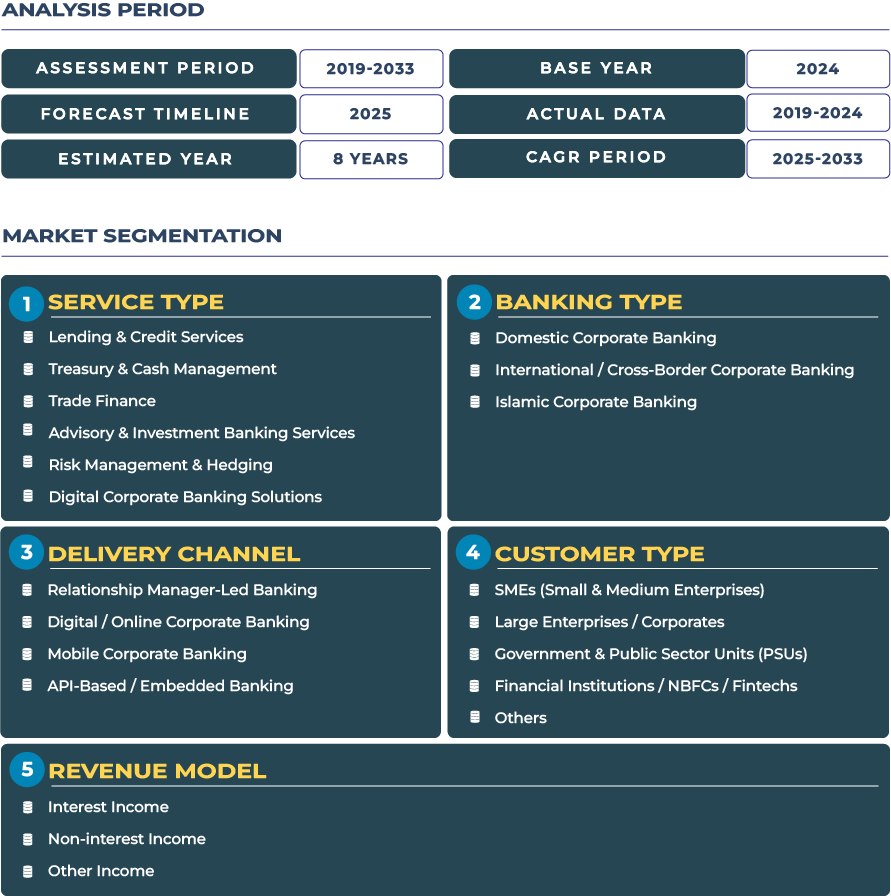SME and Trade Finance Solutions in Kuwait: Enabling Corporate Growth and Digital Integration
Kuwait corporate banking market is undergoing a strategic transformation driven by the rising focus on SME and trade finance solutions that empower domestic corporates and boost cross-border business integration. In 2025, the Kuwait Corporate Banking Market is estimated at USD 2.0 billion, projected to reach USD 2.2 billion by 2033. Despite the steady pace, the market’s resilience reflects Kuwait’s robust financial ecosystem, sovereign support, and gradual diversification away from oil dependency.
Note:* The market size refers to the total revenue generated by banks through interest income, non-interest income, and other ancillary sources.
Corporate banks in Kuwait are focusing on enhancing SME lending, trade finance instruments, and treasury management solutions that align with the country’s long-term diversification goals under Kuwait Vision 2035. The banking sector’s growing appetite for digital corporate solutions, particularly in payments, cash flow optimization, and cross-border remittances, positions Kuwait as an evolving financial hub within the GCC. Through deeper collaboration between banks and businesses, the market continues to mature into a more innovation-driven and client-centric ecosystem.
Market Outlook: Corporate Banking Expansion Anchored by SME Financing and Trade Facilitation
The Kuwait corporate banking industry is entering a phase of steady expansion fueled by an increasing number of small and medium enterprises (SMEs) seeking working capital and export financing. As the government prioritizes non-oil economic diversification, corporate banks are offering tailor-made trade finance and treasury solutions to support industrial, infrastructure, and logistics projects. Major banks like National Bank of Kuwait and Kuwait Credit Bank are introducing digital tools that enhance corporate transparency and streamline cash management processes.
Moreover, the geopolitical stability of Kuwait, coupled with prudent monetary oversight by the Central Bank of Kuwait (CBK), reinforces investor confidence. The government’s commitment to digitization and regulatory modernization provides a conducive environment for the growth of corporate banking services, particularly for mid-sized enterprises integrating into global supply chains. However, the relatively small domestic capital base and reliance on state-linked entities remain structural challenges that slow growth momentum.
Drivers & Restraints: Fueling Corporate Growth through Diversification and Treasury Demand
Strong Treasury and Export Finance Demand Strengthens Corporate Banking Performance
The primary growth driver for the Kuwait corporate banking sector is the expansion of sovereign and large corporate treasury requirements. Kuwait’s petrochemical and energy firms continue to seek specialized financing structures for exports, while conglomerates are diversifying investments into logistics, technology, and renewable sectors. Corporate banks are also catering to growing interest in diversification project lending through syndicated credit facilities that reduce concentration risks and expand their loan portfolios.
Structural Limitations and Capital Concentration Restrict Rapid Expansion
Despite strong fundamentals, several restraining factors limit accelerated growth. Kuwait’s small domestic capital market constrains large-scale corporate lending and restricts long-term project financing. Heavy dependence on sovereign entities and limited participation from private corporates in investment initiatives slow down market competitiveness. Furthermore, the limited local fintech ecosystem inhibits faster adoption of digital treasury platforms, impacting efficiency and innovation in the corporate banking ecosystem. Labor nationalization and complex regulatory approvals add operational delays, challenging banks to balance compliance with growth objectives.
Trends & Opportunities: Digitalization, Islamic Finance, and Corporate Treasury Evolution
Emerging Trends Redefining Kuwait Corporate Banking Landscape
A defining trend shaping the Kuwait corporate banking industry is the rapid integration of Islamic finance into corporate products, appealing to regional and international clients seeking Sharia-compliant solutions. Kuwaiti banks are structuring corporate loans and trade instruments under Islamic principles to meet growing demand from export-oriented and infrastructure-driven enterprises. Simultaneously, the rise in corporate treasury services for sovereign-linked enterprises is fueling demand for liquidity management, cash pooling, and hedging services.
Key Opportunities in Diversification Projects and Sukuk Issuance
Kuwait’s ongoing economic diversification projects create opportunities for banks to expand into infrastructure finance, real estate development funding, and industrial modernization lending. The rising Sukuk issuance volumes are providing an alternative financing channel for corporates, allowing banks to leverage advisory and syndication capabilities. Furthermore, the increasing number of regional partnerships with GCC banks strengthens Kuwait’s participation in cross-border corporate financing and green project funding, particularly in energy transition sectors like hydrogen and renewables.
Competitive Landscape: Strategic Collaborations Driving Corporate Banking Maturity
Kuwait corporate banking landscape is characterized by a mix of established domestic banks and international institutions expanding their footprints. Key players such as National Bank of Kuwait, Burgan Bank, and Gulf Bank continue to strengthen their positions through digital corporate platforms and cross-border finance collaborations. In 2024, National Bank of Kuwait launched enhanced trade and treasury modules to support real-time payment tracking and invoice financing for exporters, marking a significant advancement in Kuwait’s digital corporate services.
Competitive strategies revolve around developing Islamic finance models aligned with client preferences, creating supplier finance solutions that reinforce local content, and offering treasury services that secure long-term client relationships. The market is witnessing a shift toward integrated financial ecosystems where technology, advisory, and compliance converge to form a cohesive corporate banking experience. As Kuwait deepens its integration with regional economies, these strategies are expected to cement the country’s position as a critical node in GCC corporate banking growth.







